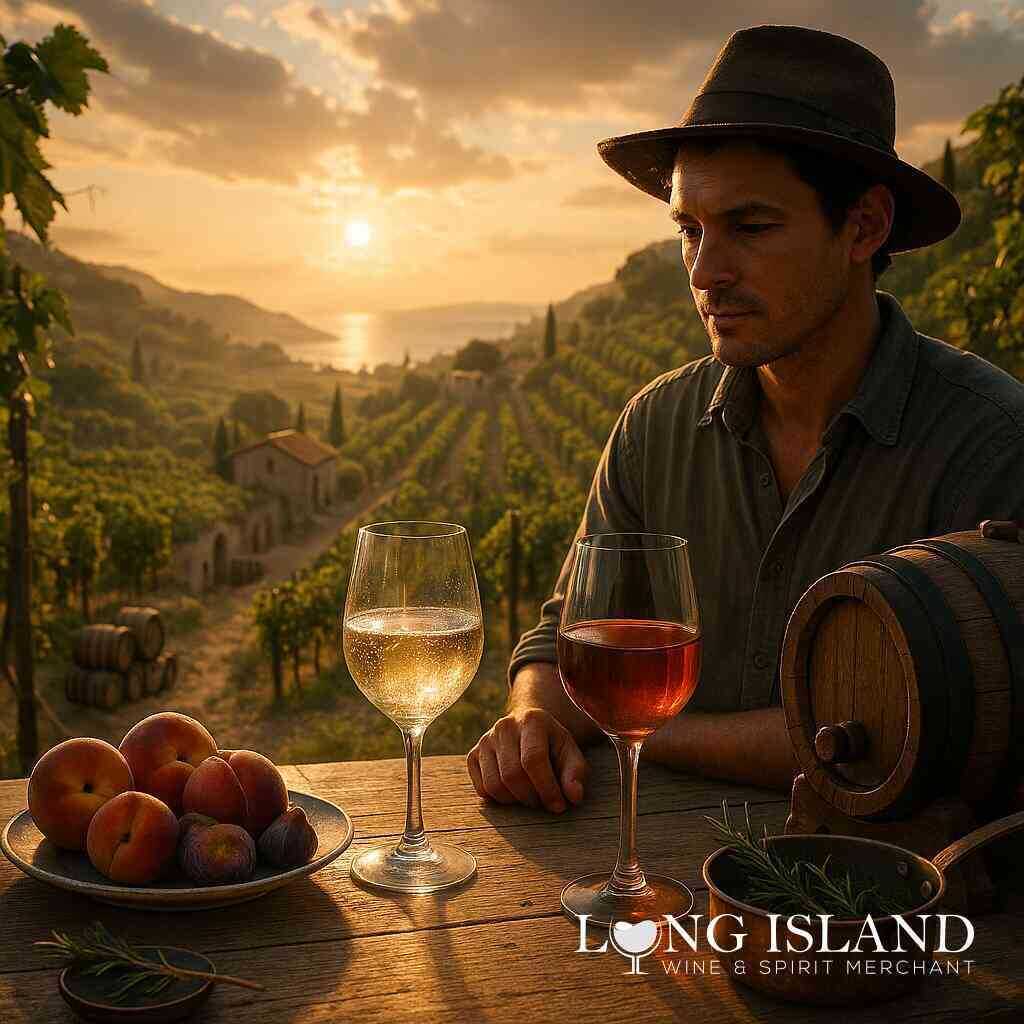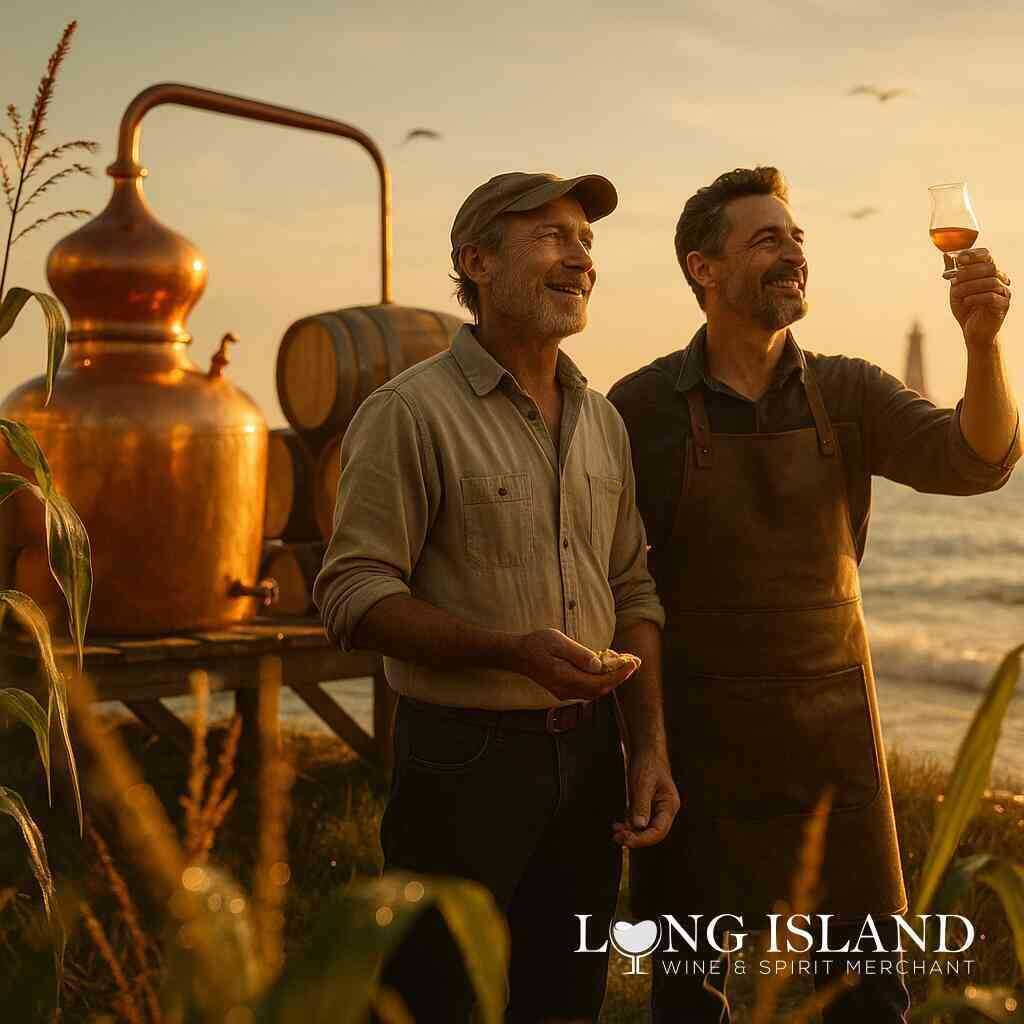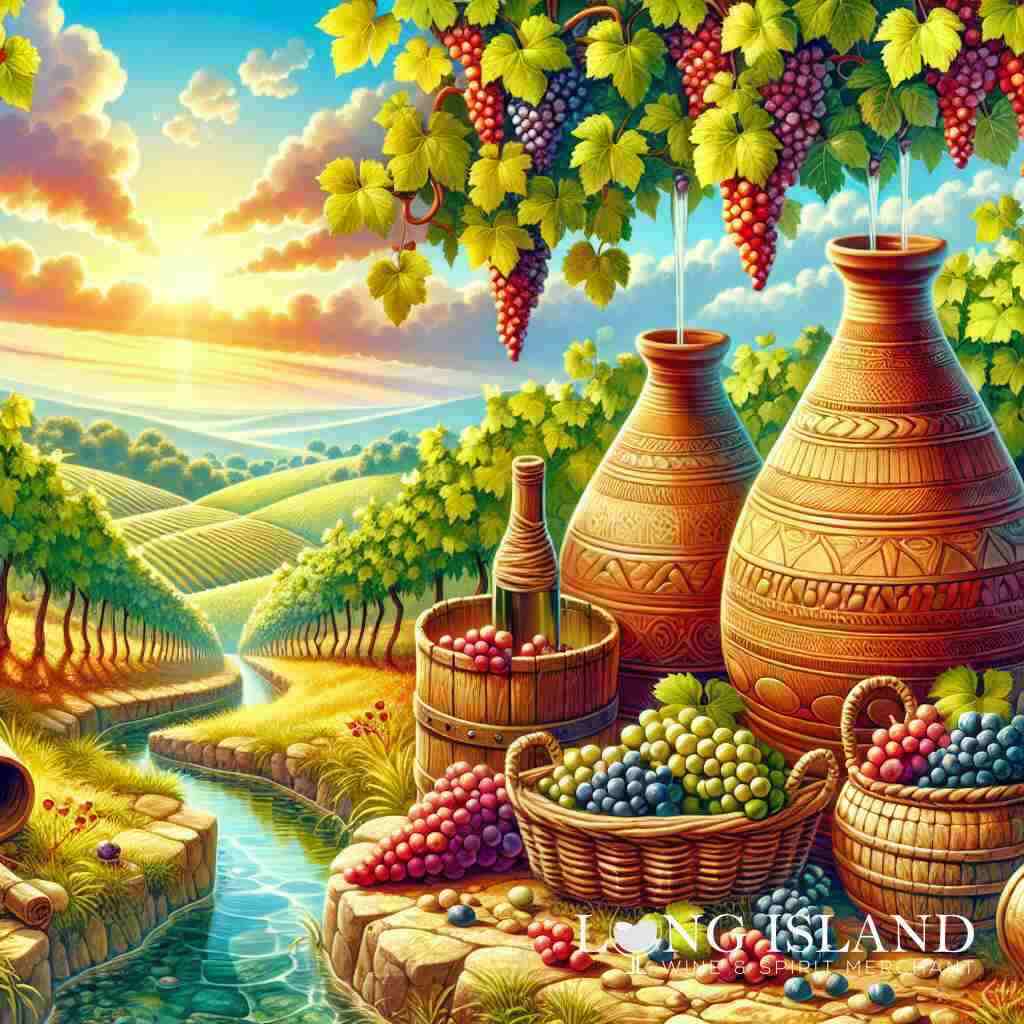
When Was Wine Invented?
September 28, 2024
Introduction to the Rich Tapestry of Wine
The concept of wine through the ages
Wine, a cherished elixir, has punctuated human civilization with its rich, fermented tales from ancient times to the modern era. Various archeological findings, such as those from the regions now known as Georgia and Armenia, suggest that humans began the art of winemaking around 6000 B.C. or earlier. This discovery, confirmed through carbon dating of ancient wine remnants, indicates wine’s pivotal role not just as a beverage but as a cornerstone in the ceremonies and daily lives of our ancestors.
How wine connects with Long Island Wine & Spirit Merchant’s heritage
At Long Island Wine & Spirit Merchant, the heritage of wine intertwines beautifully with our passion for offering a curated selection of wines that speak of history and quality. Each bottle on our shelves carries the legacy of ancient winemaking traditions, refined by modern practices to deliver excellence and authenticity. Understanding and appreciating the complex journey from vine to glass allows us to connect deeply with our customers and guide them through an enriching wine discovery experience. The connection between our store’s offerings and the millennia-old heritage of winemaking is a testament to the timeless enjoyment and communal spirit that wine brings.
Exploring the cultural significance of wine from ancient times to modern-day
The role of wine in human history is undeniably profound, influencing social structures, economies, and even religions. From the symposiums of ancient Greece to the royal courts of Europe, wine has been a symbol of status, a catalyst for social interaction, and a muse for artists and poets. Its cultural significance transcends mere consumption, embodying the essence of civilization and human creativity. At Long Island Wine & Spirit Merchant, we celebrate this rich cultural heritage by sourcing diverse wines from around the world, each with its own story and place in history. By exploring the cultural significance of wine, we not only appreciate its past but also its impact on contemporary social settings and celebrations. This exploration enriches our customers’ experience, connecting them to a deeper, more global narrative that continues to evolve and fascinate.
Unearthing the Origins: From Ancient Rituals to Today’s Glass
Earliest Evidence of Wine Production
The fascinating journey of wine began in the regions now known as Georgia and Armenia, where the earliest evidence of wine production dates back to between 5400 and 5000 B.C. This epochal discovery made possible through meticulous carbon dating, reveals that our ancestors were not just consuming grapes but were engaged in a sophisticated process of fermentation. This early dalliance with viticulture sparked a revolution that would see wine become a pivotal player in the cultural and social fabric of numerous civilizations. At Long Island Wine & Spirit Merchant, we tap into this ancient tradition, ensuring that every selection of wines available in Long Island Wine & Spirit Merchant echoes the rich narrative of its origins, thereby providing our customers with a taste of history.
Technological Advancements in Ancient Winemaking
Ancient winemaking was not just about fermenting grapes but involved intricate processes and technologies that have evolved over millennia. Clay vessels, known as Kvevris in Georgia, were among the first tools used for fermenting, aging, and storing wine. These early technological innovations are a testament to human ingenuity and their understanding of crafting beverages that stood the test of time. Engaging with ancient winemaking techniques, we glean how our winemaking forebears influenced techniques that are still influential in modern winemaking practices. Long Island Wine & Spirit Merchant prides itself in offering wines that are made through both time-honored and contemporary methods, bridging the past with the present.
The Role of Wine in Ancient Civilizations and Social Structures
Wine’s role in ancient society was multifaceted, acting as a social lubricant, medicinal solution, and religious symbol across various cultures. From the Pharaohs of Egypt to the ancient Greeks and Romans, wine was integral to religious ceremonies and communal gatherings. It symbolized wealth, status, and even divinity. As we explore the evolution of these practices in the current day Long Island context, it’s clear that wine continues to hold a revered status in social and cultural connotations. Long Island Wine & Spirit Merchant captures this essence by organizing wine-tasting events on Long Island, where the communal spirit and rich history of wine are celebrated and shared among enthusiasts and connoisseurs alike.
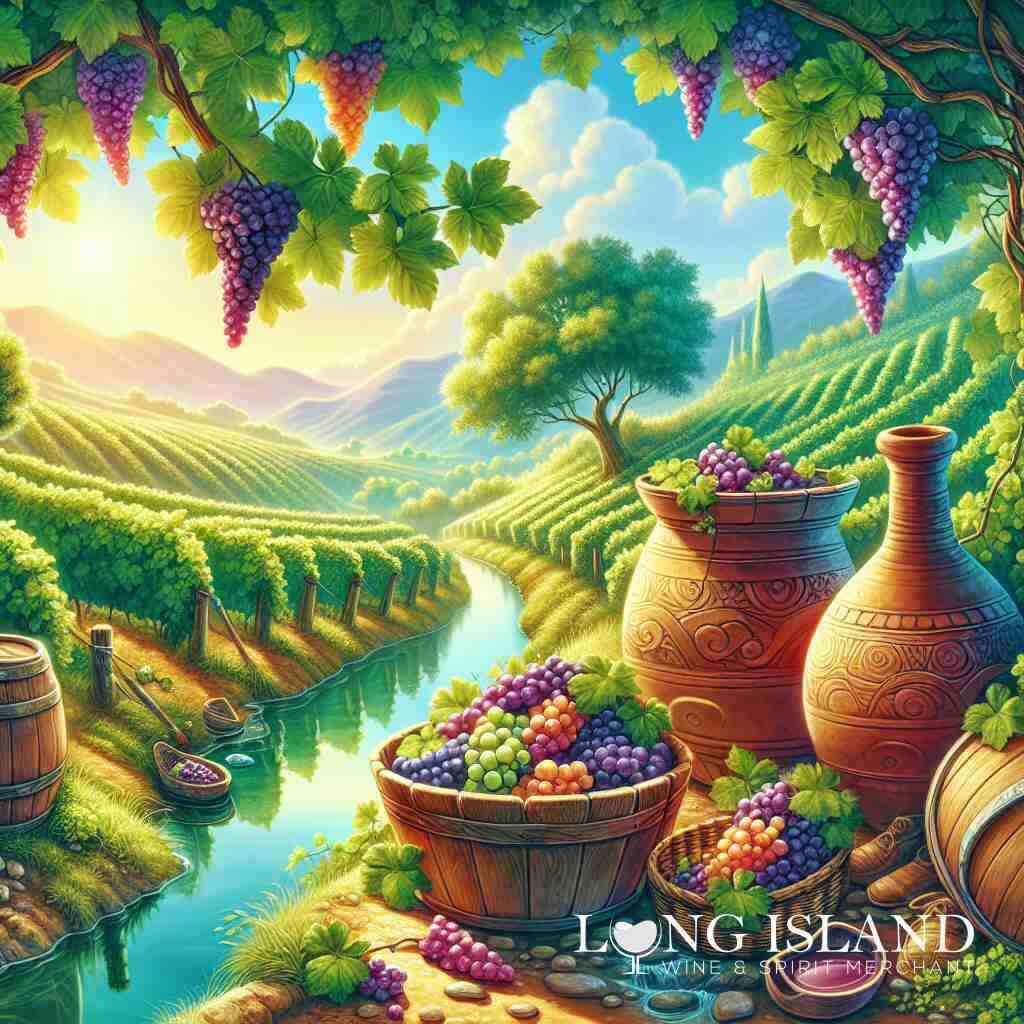
The Journey of Wine: A Timeline
Critical milestones in wine history
The earliest glimpses of viticulture
Unearthing wine’s timeline begins with the profound milestones that have punctuated its history. The discovery of the earliest known winemaking activity, found in present-day Georgia, sets our historical compass to around 6000 B.C. This revelation, unearthed through meticulous carbon dating, not only details the ancients’ interaction with grapes but underscores a fundamental shift toward agricultural society and permanent settlements.
Development of winemaking in ancient civilizations
Moving forward in the timeline, the spread of winemaking practices to ancient Egypt and Mesopotamia around 4000 B.C. marks another significant milestone. Here, wine became a symbol of cultural sophistication and an integral part of religious and ceremonial practices. The Egyptians refined the fermentation process, and their innovations served as a beacon to other civilizations around the Mediterranean.
Wine’s Journey through the Middle Ages to the Renaissance
Another leap in wine’s chronology occurred in the Middle Ages when monastic orders took up viticulture with a zeal that preserved and enhanced winemaking techniques during a time when much classical knowledge was lost elsewhere in Europe. By the time of the Renaissance, wine had become embedded in the social fabric of society, enjoyed by both the aristocracy and common folk alike.
The spread of winemaking across the globe
From the Old World to the New World
The spread of winemaking across the globe is a testament to its deeply ingrained cultural and economic significance. The Phoenicians and, later, the Greeks played critical roles in introducing viticulture to various regions in the Mediterranean, including Italy, Spain, and France. This crucial dissemination shaped the wine heritage of what are now considered traditional wine-producing nations.
Colonial expansions and winemaking
As European nations embarked on colonial expansions from the 15th century onwards, viticulture found new terrains. The Spanish missionaries brought vineyards to the Americas, planting the seeds for future wine industries in Chile, Argentina, and California. Similarly, European settlers introduced wine to South Africa and Australia, blending Old World techniques with new terroirs.
Modern globalization of wine
The globalization movement in the 20th century brought further expansion, innovation, and recognition to wine regions in New Zealand, Canada, and even parts of Asia. Each geographical expansion was accompanied by cultural integration, where wine adapted to local tastes and traditions, further enriching the global wine heritage.
Influence of historical events on winemaking techniques
Ancient techniques and innovations
The historical evolution of winemaking techniques reveals a fascinating interplay of innovation driven by necessity and cultural exchange. Ancient techniques such as using amphorae for fermentation and storage in Greece and Rome laid the groundwork for what would become staple practices in winemaking. These methods provided not only functional solutions but also influenced the flavor profiles of the wines produced.
Impact of the Industrial Revolution
Significant leaps occurred during the Industrial Revolution, which introduced mechanization and scientific methods to viticulture and enology. Innovations such as the hydrometer and temperature-controlled fermentation tanks revolutionized the consistency and quality of wine, making good wine accessible and not just a luxury for the elite.
Modern winemaking practices
Today’s winemaking techniques continue to evolve with technology, such as precision agriculture and data analytics, that enhance vineyard yield and grape quality. Vintners’ integration of both historical techniques and modern technology underscores wine’s unique position as a bridge between the past and the present, reflected in modern winemaking practices at establishments like Long Island Wine & Spirit Merchant.
As we journey through wine’s storied past, each sip offers a taste of its rich, cultivated heritage timeline that spans millennia and continues to evolve, inviting us to explore deeper connections with every bottle.
Modern Winemaking and Wine Culture at Long Island Wine & Spirit Merchant
How Traditional Methods Influence Modern Practices
At Long Island Wine & Spirit Merchant, our appreciation for wine is deeply rooted in the ancient practices that have shaped modern winemaking. The careful selection of each wine bottle in our store reflects a blend of historical techniques and the latest innovations. By integrating traditional methods like oak barrel aging with modern technologies such as controlled fermentation, we ensure that each bottle offers a unique narrative that honors its origin while delivering superior quality. This harmonious blend of old and new practices not only enriches the flavor profiles of our wines but also respects the wine’s historical significance, making every sip a testament to centuries of winemaking evolution.
Wine Tasting and Educational Events
To deepen our customers’ understanding of wine, Long Island Wine & Spirit Merchant regularly hosts wine-tasting and educational events right here in Commack, New York. These gatherings are more than just an opportunity to taste different wines; they’re a cultural experience that transports attendees through time and geography. At each event, participants can expect to learn about the intricate details of wine production methods, the characteristics of various types of wine, and the rich history behind their chosen glasses. It’s a perfect way for both novices and connoisseurs to expand their wine knowledge and refine their palates in a community setting.
Selection of Historical and Modern Wines Available at Long Island Wine & Spirit Merchant
From ancient heirlooms to contemporary classics, our selection at Long Island Wine & Spirit Merchant spans the full spectrum of wine history. We proudly feature wines that tell a story, whether it’s a vintage wine that illustrates traditional winemaking techniques or a modern blend that reflects cutting-edge practices. Patrons visiting our store at the Northgate Shopping Center can explore a curated collection that includes everything from robust reds and elegant whites to sparkling varieties. Each wine is chosen not only for its flavor and quality but also for its ability to represent a piece of winemaking history. This thoughtful curation ensures that whether you are building your custom case of wine or selecting a gift, you’ll find the perfect bottle to suit any taste and occasion.
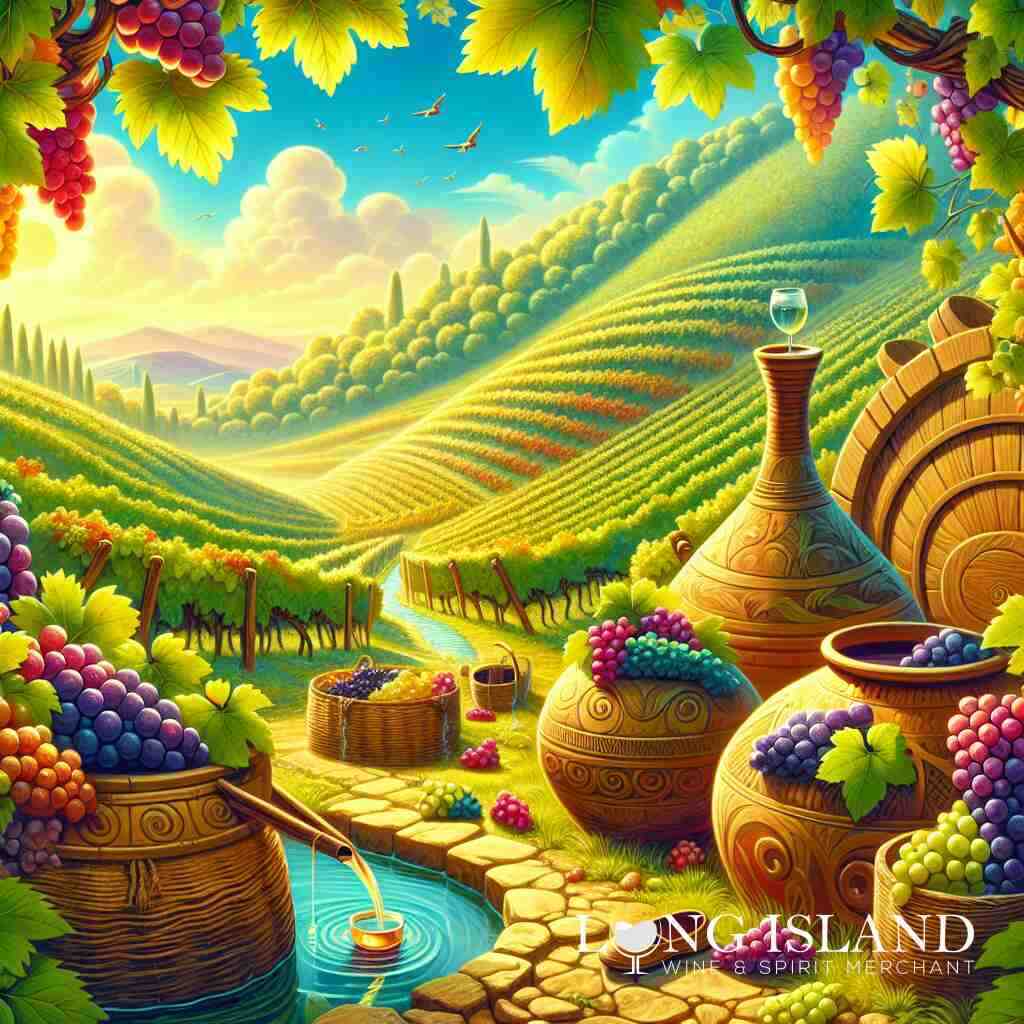
Conclusion: Wine’s Enduring Legacy
How ancient winemaking paved the way for current wine culture
The narrative of wine is not merely about fermentation but a story rich with cultural, social, and economic threads that have woven their way through human history. The ancient practice of winemaking, as evidenced by remnants dating back to 5400-5000 B.C., has profoundly influenced today’s viticultural practices and wine culture. In these early eras, the Earth itself was a laboratory where humans experimented with grape cultivation, learning the effects of soil, climate, and technique. This deep-rooted legacy is evident in modern wine production methods, which still respect many age-old traditions despite the advent of technological advancements. At Long Island Wine & Spirit Merchant, we cherish this heritage, recognizing that today’s wine culture is built on the foundation laid by our ancestors. Our diverse selection of wines on Long Island reflects this profound connection, offering our customers not just a beverage but a taste of history.
The future of wine is explored through the lens of its rich history
Looking ahead, the future of wine is as promising as its storied past. As we advance, the integration of technology in viticulture and enology promises even greater precision in wine production without losing the soul of traditional winemaking. Sustainable practices are becoming increasingly important, echoing the ancient balance between nature and human intervention. What’s more, the expanding global palate for wine suggests a continuing evolution of wine styles and preferences where innovation meets tradition. At Long Island Wine & Spirit Merchant, we are excited to be part of this evolution, constantly updating our wine selection to ensure it celebrates both the heritage and future of winemaking. As we embrace these changes, we continue to offer education and tasting events to engage and inform wine lovers about these exciting developments.
Invitation to experience history with every bottle from Long Island Wine & Spirit Merchant
We invite you to visit Long Island Wine & Spirit Merchant at Northgate Shopping Center to discover a wine experience that transcends time. Each bottle in our expansive collection not only represents the finest vineyards from around the world but also carries with it centuries of history. From the vine to your glass, wine is a narrative of human endeavor, cultural growth, and artistic expression. Whether you are new to wine or a seasoned connoisseur, our expert staff is eager to guide you through a historical journey with each selection. Engage with us, explore our curated cases of wine, or attend one of our tasting events to connect with wine’s enduring legacy. Every sip is an invitation to explore, appreciate, and celebrate the timeless journey of wine.
Frequently Asked Questions
Question: What is the oldest evidence of wine production, and how does it relate to the wines at Long Island Wine & Spirit Merchant?
Answer: The earliest evidence of wine production traces back to around 6000 B.C. in regions now part of modern Georgia and Armenia. This profound heritage resonates with our commitment at Long Island Wine & Spirit Merchant to offer wines that reflect their storied pasts. We ensure each wine available, like those made using traditional winemaking methods or those from vineyards with historical significance, communicates the profound narrative of ancient viticulture.
Question: In the blog post ‘When Was Wine Invented?’ There is an emphasis on the cultural significance of wine. How does Long Island Wine & Spirit Merchant celebrate this aspect?
Answer: At Long Island Wine & Spirit Merchant, we embrace the rich cultural history of wine by curating a diverse selection of offerings from various global traditions and hosting wine-tasting and educational events in Commack, New York. These events are a portal into the wine’s cultural journey, where attendees can appreciate both the ancient traditions and modern innovations encoded in each bottle.
Question: How do advancements in wine archaeology influence the selection of wines at Long Island Wine & Spirit Merchant?
Answer: Developments in wine archaeology, especially discoveries around wine’s ancient past and evolution, guide us in handpicking wines that do justice to this rich heritage. Our selection process privileges wines that demonstrate the traditional methods highlighted by recent archaeological insights and are reflective of historical wine-producing regions, ensuring our customers enjoy a genuine taste of history.
Question: Can you describe how Long Island Wine & Spirit Merchant incorporates both modern and traditional winemaking practices in their wine selection process?
Answer: At Long Island Wine & Spirit Merchant, we value the blend of tradition and innovation. Our selection includes wines made through ancient practices like oak barrel aging alongside those crafted using modern technologies like controlled fermentation. This dual approach allows our wines to honor their historical roots while delivering the quality and richness that modern palates expect.
Question: What recommendations do Long Island Wine & Spirit Merchants have for someone looking to explore wines with significant historical backgrounds?
Answer: For those intrigued by wines with considerable historical backgrounds, we recommend starting with wines from regions known for their long-standing viticultural history, such as those from parts of Italy, Georgia, or France. Additionally, exploring varietals that have been cultivated over centuries, such as Cabernet Sauvignon or Merlot, can offer insights into the agricultural and cultural narratives of wine. Our staff at Long Island Wine & Spirit Merchant is always ready to guide you through our selection to find wines that resonate with historical importance.

